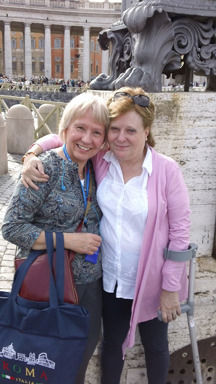Letters tell an Irish American love story
by Maggie Fitzgibbon
 It’s a love story that took place during World War II. An America soldier falls in love with a young girl from Northern Ireland. Their story is one that survived a test of time and distance. Despite a war and the challenges with communicating, their love and devotion for each other endured. Their story is chronicled in their letters, photos and telegrams compiled by their daughter, Spencerport resident Melanie Friscia Ippolito, into a book titled I’ll Be Back When Summer’s in the Meadow, Volume I.
It’s a love story that took place during World War II. An America soldier falls in love with a young girl from Northern Ireland. Their story is one that survived a test of time and distance. Despite a war and the challenges with communicating, their love and devotion for each other endured. Their story is chronicled in their letters, photos and telegrams compiled by their daughter, Spencerport resident Melanie Friscia Ippolito, into a book titled I’ll Be Back When Summer’s in the Meadow, Volume I.
Ippolito is the second daughter of Raymond Friscia and Muriel Mitchell. Her father was raised in Lockport, NY and her mother in Belfast, Northern Ireland. Raymond was inducted into the Army in 1941 and assigned to the Medical Corps. In the spring of 1942, he was sent to Northern Ireland to work in an Army hospital. A few short months later, he met the love of his life, Muriel.
Their courtship evolved through letters and short visits. “Some of their letters were censored by officials, words and sections were removed. But their letters were their way of communicating, they couldn’t see or talk to each other for years,” Ippolito explained.
This relationship resulted in marriage despite family objections. Raymond, a Roman Catholic, and Muriel, a Methodist, carried their relationship past what was described as a ‘mixed marriage.’ During this time, Northern Ireland was divided by faiths; Roman Catholics lived, shopped, socialized, and went to church in certain areas and neighborhoods. And the same was true for Protestants. Rarely did the two faiths intermingle. Although they cared for Raymond, Muriel’s family was concerned for her happiness and welfare. Seldom did one marry out of their faith and hardly ever did these marriages survive. After they married, Muriel left her family in Northern Ireland and moved to the United States to begin a new life with Raymond.
 Melanie Ippolito and her Irish cousin, Barbara, stand in front of their grandparent’s row house in Belfast, Northern Ireland in 1958. This is the same home her mother grew up in. Ippolito is shown on the right, and the little girl to the left back of her cousin is Melanie’s younger sister, Cindy. Provided photoAs a young girl growing up, Ippolito knew her parents’ story was special.
Melanie Ippolito and her Irish cousin, Barbara, stand in front of their grandparent’s row house in Belfast, Northern Ireland in 1958. This is the same home her mother grew up in. Ippolito is shown on the right, and the little girl to the left back of her cousin is Melanie’s younger sister, Cindy. Provided photoAs a young girl growing up, Ippolito knew her parents’ story was special.
“As kids, my sisters and brother knew how devoted my parents were to each other. They were always willing to share their experiences as a young couple living through the war,” Ippolito said.
Their family life was full, busy and filled with activity. “There was always something going on with four children,” Ippolito said. Long summer vacations were spent in Ireland with her extended maternal family. During these times Ippolito and her siblings came to know their cousins and aunts. “If we weren’t visiting Ireland, we had family coming here,” she added. These family friendships continued into the next generation. Ippolito’s cousin’s children spent summers in America with her children. During a trip this past summer to Rome, Italy, Ippolito reunited with her Irish cousin.
Life in the Friscia home was an assimilation of faiths and cultures, Irish and Italian and Catholic and Methodist. “We had either pasta or potatoes with every meal,” she said. The Christmas holiday was special, “My dad would shop at an Italian market. He would always make sausage,” she said. But the differences in faith did not create troubles for this couple.
“We were raised Episcopalian, that was their compromise. By the time he passed, my dad was a member of our church; he was an usher,” she said.
When Ippolito was 13, she stumbled across a box of letters in her mother’s closet. Something told her of their importance, but she respectfully placed the letters back where she found them without reading any of these accounts. Ippolito describes her mother as a saver and not until her mother’s passing did Ippolito understand why.
“My mother passed in 1988. I was sorting through her belongings with my father, brother and sister and we came across the letters, neatly bundled and stored. My father asked me to burn them. But I asked him to reconsider and told him that mom saved them for a reason. I tucked them back into the closet, and said a prayer,” Ippolito said.
Ten years later, her father passed. Ippolito and her siblings went about sorting through his personal items. Again, the letters were discovered. Ippolito knew it was time to chronicle their story.
 Melanie Ippolito and her cousin, Barbara (right) in October 2011 in St. Peter’s Square in Rome, Italy. Provided photoWith the help of her sister Colleen, Ippolitto carefully read each of these letters and wove together her parents’ love story.
Melanie Ippolito and her cousin, Barbara (right) in October 2011 in St. Peter’s Square in Rome, Italy. Provided photoWith the help of her sister Colleen, Ippolitto carefully read each of these letters and wove together her parents’ love story.
“After my dad passed, reading their letters gave me a sense of comfort. I knew there was a story here. As I read the letters, I was transported into their life and I learned how much they truly loved each other,” she said. “I discovered how loyal they were to each other. They both had opportunities to have other relationships, but they didn’t.”
As Ippolito gathered the letters, and photos and telegrams, her main intent was to share this record with family. But friends encouraged her to publish this book because of its value to others.
“The story tells so much of our history. During the war, people could not talk or see each other. Young people have no idea how families lived during these difficult times. Now we have Skype, cell phones and the Internet,” she said.
She has many hopes for her book. “I encourage people to ask questions of their parents and grandparents. Search their attics to find pieces of family history, like my parents’ letters, and share these stories,” she said.
Ippolito continues to gather and compile her parents’ letters, I’ll Be Back When Summer’s in the Meadow, Volume II, will be released this spring and she is currently working on Volume III. Volume I may be purchased online at www.merriam-press.com.





